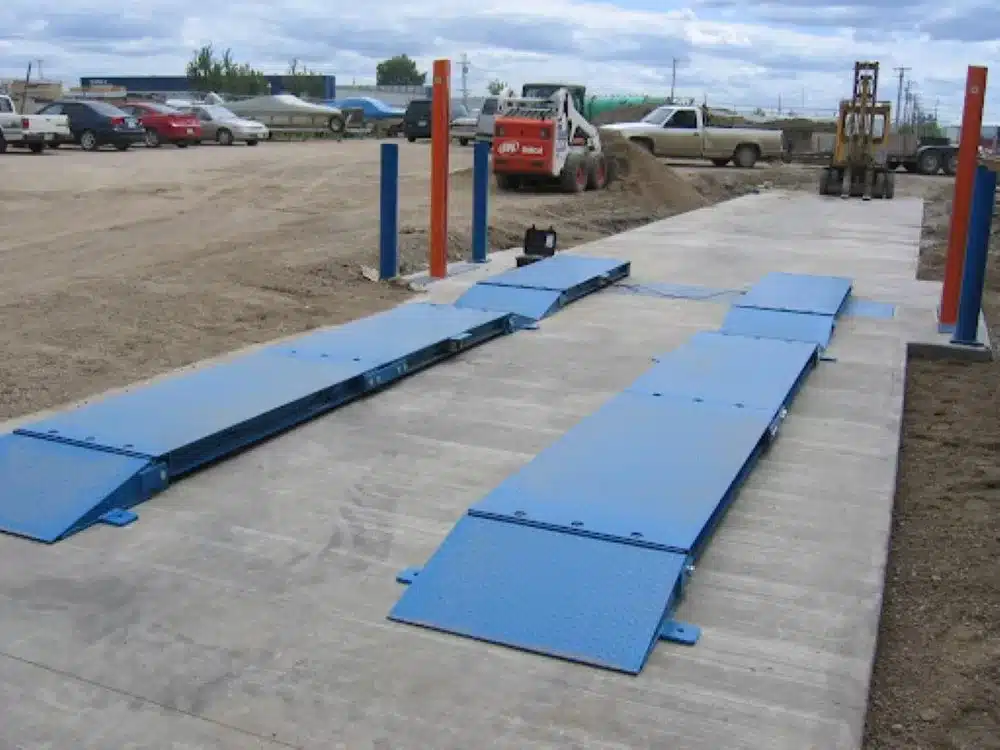 October 25, 2023
October 25, 2023
In the world of transportation and weighing operations, portable truck scales are indispensable tools. They serve as the foundation for achieving precise weight measurements, a fundamental requirement across various industries.
However, the value of owning a weight scale lies in its unwavering precision. Much like a dependable ally, a scale must maintain its accuracy and reliability to be truly beneficial. Therefore, ensuring the consistent performance of these portable scales is of utmost importance.
This article embarks on an exploration of portable truck scale maintenance, shedding light on indicators that your scale may require calibration and offering essential tips to keep it consistently performing at its best.
Cleaning Your Portable Truck Scale: The First Step
Regular cleaning is essential for portable truck scale maintenance. A clean scale is an accurate scale.
You need to remove dirt, debris, and other foreign objects from the scale platform consistently. Dirt buildup can affect the accuracy of weight measurements.
You can clean your scale using various methods, such as brooms, vacuums, or pressurized water. However, be cautious with water, as it can harm sensitive electronics in portable truck scale applications.
Also, remember to protect critical internal components, like load cells, to avoid costly repairs and damage.
Inspecting Truck Scales for Damage: Preventing Problems
Damage can lead to issues or costly repairs, so regular checks are crucial. Examine load cells, cables, axle load sensors, bearings, and other essential components to reduce potential risks.
If the load cells are corroded or damaged, they may provide inaccurate weight measurements.
You can use a soft brush or compressed air for targeted cleaning to prevent damage. Additionally, regularly inspect electrical components like cables, junction boxes, and indicators.
These components work together to provide accurate measurements, and addressing electrical issues is essential to prevent errors or system failures.
Addressing Environmental Considerations: Protecting Your Scale
Maintaining a portable truck scale in challenging environments requires protecting it from damage and corrosion.
While some scales can handle outdoor elements and tough conditions, protecting portable weight scales for trucks from extreme temperatures, moisture, and corrosion is essential for all models to avoid costly repairs.
Maintenance in Wet Conditions: Be Prepared
When you’re tasked with maintaining your portable truck scale in damp or rainy conditions, it’s essential to be well-prepared.
Consider potential issues like water getting into junction boxes and water pooling within the scale’s working area. Here’s a plan to stay ahead:
Weatherproof Junction Boxes
To keep rainwater at bay, ensure that your junction boxes are weatherproofed for outdoor use. Regularly inspect them for any signs of damage or condensation that could lead to measurement errors. Avoid using plastic coverings, as they may trap condensation inside.
Managing Standing Water
Standing water is a nemesis that can lead to rust and corrosion, potentially damaging sensitive internal components. To tackle this, you have a couple of smart strategies:
Natural Drainage
Position your portable truck scale in a way that lets natural drainage occur. This helps prevent pooling and condensation inside the scale.
Sump Pumps
In areas with poor drainage, sump pumps are lifesavers. They safeguard your truck scales by swiftly removing standing water from beneath the application. However, this approach requires regular service and maintenance of the pump to ensure ongoing protection and prevent issues like flooding, damage, and corrosion.
By being proactive and prepared, you can effectively manage the challenges of maintaining your portable truck scale in wet conditions, ensuring its durability and reliable performance even when the weather turns soggy.
Portable Truck Scales Calibration
Calibration is crucial for portable truck scale maintenance as it determines the scale’s performance.
Axle scale calibration involves comparing device readings to measurements of a known weight. The calibration frequency depends on factors like daily operations, usage duration, and environmental conditions.
While general truck scale maintenance suggests yearly calibration, more frequent calibrations may be needed due to operational demands or environmental challenges. Performing eccentricity, repeatability, and linearity tests can help check the accuracy of portable truck scales.
However, for absolute precision, professional scale technicians should routinely perform calibrations.
Electrical Components and Wiring
Pay close attention to electrical components and wiring to maintain your portable truck scale effectively. Faulty wiring or damaged components can lead to measurement errors or system failures.
Regularly inspect, clean, and protect these elements to ensure accurate readings and smooth operations.
Operator Training and Guidelines
Ensuring your team is well-versed in safe and proper portable truck scale operation is vital for maintenance. This involves:
Safety Knowledge
Familiarity with safety protocols and potential hazards.
Correct Usage
Proficiency in proper scale operation to extend its lifespan.
Cleaning Procedures
Awareness of effective cleaning methods.
Issue Recognition
The ability to identify potential problems early.
Emergency Response
Knowing how to respond to malfunctions or safety concerns.
Calibration Awareness
Understanding the importance of accurate measurements.
Comprehensive training ensures safe and efficient scale use, contributing to its longevity and reliability.
Setting Up a Maintenance Record-Keeping
Creating a regular maintenance schedule is essential to maximize the lifespan and performance of your portable truck scale. Here’s a straightforward plan:
Comprehensive Coverage
The schedule should include cleaning, inspections, and calibrations. The timing for these tasks should match your operational needs and the environmental conditions.
Detailed Records
Maintaining thorough records of all your maintenance activities is vital. These records serve multiple purposes:
Tracking
They help you keep track of when maintenance was performed, ensuring that tasks aren’t missed or delayed.
Issue Identification
Records assist in identifying any problems encountered during maintenance, allowing for timely troubleshooting and resolution.
Performance Assessment
They provide a historical record of your scale’s performance, helping you assess its reliability and accuracy over time.
Informed Decision-Making
With comprehensive documentation in hand, you can make well-informed decisions about future maintenance needs. You’ll be able to spot trends, anticipate potential issues, and fine-tune your maintenance schedule for the best results.
8 Consequences of Neglecting Maintenance
Neglecting maintenance for portable truck scales can lead to several critical consequences:
1. Inaccurate Measurements
Neglected maintenance can cause weight discrepancies, leading to financial losses and disputes.
2. Operational Disruptions
Lack of maintenance can result in scale breakdowns, causing workflow disruptions and costly delays.
3. Safety Hazards
Damaged components due to neglect can pose safety risks for personnel and cargo.
4. Increased Repair Costs
Minor issues left unaddressed can escalate, leading to higher repair expenses.
5. Shortened Lifespan
Neglected scales may require more frequent replacements, increasing long-term costs.
6. Regulatory Non-Compliance
Neglect can lead to violations of industry regulations, resulting in fines and penalties.
7. Loss of Customer Trust
Inconsistent measurements erode customer trust, potentially leading to business loss.
8. Impact on Productivity
Scale-related issues can reduce productivity, leading to missed opportunities and increased labor costs.
Neglecting maintenance for portable truck scales can have significant repercussions, including financial losses, safety risks, compliance issues, and reduced operational efficiency. Regular maintenance is essential to ensure accurate and reliable scale performance.
Maintaining your portable weight scales for trucks is not just about prolonging their lifespan; it’s about ensuring the accuracy and reliability of weight measurements. Regular cleaning, inspections, and calibrations, along with environmental considerations, are all vital aspects of this ongoing process. Neglecting maintenance can result in measurement errors, costly repairs, and operational disruptions.
By adhering to best practices and implementing a robust maintenance schedule, you can keep your portable truck scales in optimal working condition with less cost for a long time.
Massload Technologies: Your Trusted Expert in Portable Truck Scales
Want to know more about portable truck scales?
Massload Technologies has been a leader in the weighing industry since 1981. We offer extensive product knowledge and technical expertise to find solutions to a number of weighing challenges across industries and applications. Contact us with any questions or request a quote for a solution that meets your requirements.


